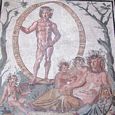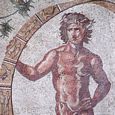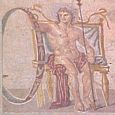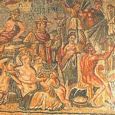KHRONOS
Greek Name
Χρονος
Transliteration
Khronos
Latin Spelling
Chronos, Chronus
Translation
Time (khronos)
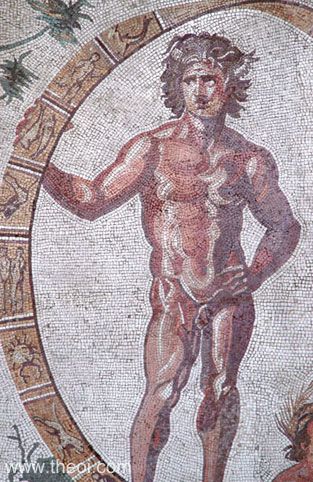
KHRONOS (Chronos) was the primordial god of time. In the Orphic cosmogony he emerged self-formed at the dawn of creation. Khronos was envisaged as an incorporeal god, serpentine in form, with three heads--that of a man, a bull, and a lion. He and his consort, the serpentine goddess Ananke (Inevitability), enveloped the primordial world-egg in their coils and split it apart to form the ordered universe of earth, sea and sky. After this act of creation the couple circled the cosmos driving the rotation of heaven and the eternal passage of time.
The figure of Khronos was essentially a cosmological double of the Titan Kronos (Cronus) ("Father Time"). The Orphics sometimes merged Khronos with the creator-god Phanes, and also equated him with the Titan Ophion. His equivalent in the Phoenician cosmogony was probably Olam (Eternal Time) whose name is written Oulomos in Greek transcripts.
Khronos was depicted in Greco-Roman mosaic as Aion (Aeon), eternity personified. He holds a wheel inscribed with the signs of the zodiac and Gaia (Mother Earth) usually reclines at his feet. The poet Nonnus describes Aion as an old man with long, white hair and a beard but mosaic-art presents a youthful figure.
FAMILY OF CHRONOS
PARENTS
[1.1] HYDROS & GAIA (Orphic
Fragments 54 & 57)
[2.1] NONE (he emerged at creation) (Nonnus Dionysiaca 7.7 & 12.34)
OFFSPRING
[1.1] KHAOS, AITHER, PHANES (by Ananke) (Orphic Argonautica 12)
[1.2] KHAOS, AITHER, EREBOS (by Ananke) Formed PHANES & WORLD-EGG (Orphic Fragment 54)
[1.3] KHAOS, AITHER (Orphic
Rhapsodies 66)
[1.4] Formed WORLD-EGG out of Aither (containing GAIA & OURANOS) (Orphic Rhapsodies 66, Orphic Frag 54 & 57,
Epicuras Frag)
[2.1] HEMERA (by Nyx) (Bacchylides
Frag 7)
[4.1] THE MOIRAI (by Nyx) (Tzetzes on Lycophron)
[5.1] THE TWELVE HORAI (Nonnus Dionysiaca
12.15)
ALTERNATE NAMES & NAME SPELLINGS
Greek Name
Χρονος Κρονος
Αιων
Πορος
Transliteration
Khronos, Kronos
Aiôn
Poros
Latin Spelling
Chronus, Cronus
Aeon
Porus
Translation
Portion of Time*
Age, Eternity (aiôn)
Contrivance, Passage
* The Greek word khronos speaks of an indeterminable portion of time, in contrast to hora, a fixed portion.
CLASSICAL LITERATURE QUOTES
CHRONOS & THE BIRTH OF THE COSMOS
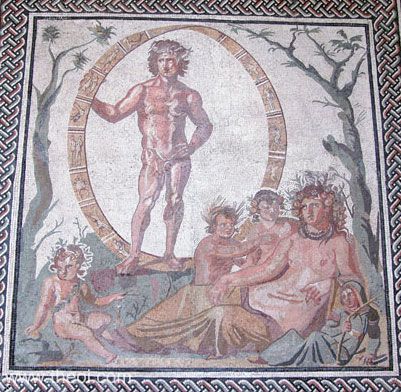
I. THE COSMOGONY OF ALCMAN
Alcman, Fragment 5 (from Scholia) (trans. Campbell, Vol. Greek Lyric II) (Greek lyric
C7th B.C.) :
"‘[First came] Thetis (Creation). After that, ancient Poros (Contriver) [perhaps Khronos (Chronos)]
and Tekmor (Tecmor, Ordinance) [perhaps Ananke]’ : Tekmor came into being after Poros . . . thereupon . .
. called him Poros (Contriver) since the beginning provided all things; for when the matter began to be set in
order, a certain Poros came into being as a beginning. So Alkman (Alcman) represents the matter of all things as
confused and unformed.
Then he says that one came into being who set all things in order, then that Poros came into being, and that
when Poros had passed by Tekmor followed. And Poros is as a beginning, Tekmor like an end. When Thetis
(Creation) had come into being, a beginning and end of all things came into being simultaneously, and all things
have their nature resembling the matter of bronze, while Thetis has hers resembling that of a craftsman, Poros
and Tekmor resembling a beginning and the end.
He uses the word ancient for old. ‘And the third, Skotos' (Scotus, Darkness) [Erebos]’ : since
neither sun nor moorn had come into being yet, but matter was still undifferentiated. So at the same moment
there came into being Poros and Tekmor and Skotos. ‘Amar (Day) [Hemera] and Melana (Moon) [Selene] and
third, Skotos (Darkness) as far as Marmarugas (Flashings)’ : days does not mean simply day, but contains
the idea of the sun. Previously there was only darkness, and afterwards, when it had been differentiated, light
came into being."
II. THE ORPHIC COSMOGONY
Orphica, Theogonies Fragment 54 (from Damascius) (trans. West) (Greek hymns C3rd -
C2nd B.C.) :
"Originally there was Hydros (Water), he [Orpheus] says, and Mud, from which Ge (Gaea, the Earth)
solidified : he posits these two as first principles, water and earth . . .
The one before the two [Thesis, Creation], however, he leaves unexpressed, his very silence being anintimation
of its ineffable nature. The third principle [Khronos (Chronos), Time] after the two was engendered by these--Ge
(Earth) and Hydros (Water), that is--and was a Serpent (Drakon) with extra heads growing upon it of a bull and a
lion, and a god's countenance in the middle; it had wings upon its shoulders, and its name was Khronos (Chronos,
Unaging Time) and also Herakles (Heracles). United with it was Ananke (Inevitability, Compulsion), being of the
same nature, or Adrastea, incorporeal, her arms extended throughout the universe and touching its extremities. I
think this stands for the third principle, occuping the place of essence, only he [Orpheus] made it bisexual [as
Phanes] to symbolize the universal generative cause. And I assume that the theology of the [Orphic]
Rhapsodies discarded the two first principles (together with the one before the two, that was left
unspoken) [i.e., the Orphics discarded the concepts of Thesis, Khronos and Ananke], and began from this third
principle [Phanes] after the two, because this was the first that was expressible and acceptable to human ears.
For this is the great Khronos (Unaging Time) that we found in it [the Rhapsodies], the father of Aither
(Aether, Light) [upper air] and Khaos (Chaos, the Chasm) [lower air]. Indeed, in this theology too [the
Hieronyman Rhapsodies], this Khronos (Time), the serpent has offspring, three in number : moist Aither
(Aether, Light)--I quote--, unbounded Khaos (Chaos), and as a third, misty Erebos (Darkness) . . . Among these,
he says, Khronos (Chronos, Time) generated an egg--this tradition too making it generated by Khronos, and born
‘among’ these because it is from these that the third Intelligible triad is produced
[Protogonos-Phanes]. What is this triad, then? The egg; the dyad of the two natures inside it--male and
female--[Ouranos (Uranus) and Gaia (Gaea), Heaven and Earth], and the plurality of the various seeds between;
and thirdly an incorporeal god [Phanes] with golden wings on his shoulders, bulls' heads growing upon his
flanks, and on his head a monstrous serpent, presenting the appearance of all kinds of animal forms . . . And
the third god of the third triad this theology too celebrates as Protogonos (First-Born) [Phanes], and it calls
him Zeus the order of all and of the whole world, wherefore he is also called Pan (All). So much this second
genealogy supplies concerning the Intelligible principles."
Orphica, Theogonies Fragment 57 (from Athenogoras) :
"The gods, as they [the Greeks] say, did not exist from the beginning, but each of them was born just as we
are born . . . and Orpheus--who was the original inventor of the gods' names and recounted their births and said
what they have all done, and who enjoys some credit among them as a true theologian, and is generally followed
by Homer, above all about the gods--also making their first genesis from water : ‘Okeanos (Oceanus), who
is the genesis of the all.’
For Hydros (Water) was according to him the origin of everything, and from Hydros (the Water) mud formed, and
from the pair of them a living creature was generated with an extra head growing upon it of a lion, and another
of a bull, and in the middle of them a god's countenance; its name was Herakles (Heracles) and Khronos (Chronos,
Time). This Herakles generated a huge egg, which, being filled full, by the force of its engenderer was broken
in two from friction. Its crown became Ouranos (Uranus, Heaven), and what had sunk downwards, Gaia (Gaea,
Earth). There also came forth an incorporeal god [Protogonos-Phanes]."
Orphica, Rhapsodies Fragment 66 :
"This Khronos (Chronos, Unaging Time), of immortal resource, begot Aither (Aether, Light) [upper air] and
great Khaos (Chaos, the Chasm) [lower air], vast this way and that, no limit below it, no base, no place to
settle. Then great Khronos fashioned from (or in) divine Aither (Aether) a bright white egg [from which Phanes
was born]."
Orphica, Epicuras Fragment (from Epiphanius) :
"And he [Epicurus] says that the world began in the likeness of an egg, and the Wind [the entwined forms of
Khronos (Chronos, Time) and Ananke (Inevitability)] encircling the egg serpent-fashion like a wreath or a belt
then began to constrict nature. As it tried to squeeze all the matter with greater force, it divided the world
into the two hemispheres, and after that the atoms sorted themselves out, the lighter and finer ones in the
universe floating above and becoming the Bright Air [Aither (Aether)] and the most rarefied Wind [probably Khaos
(Chaos, Air)], while the heaviest and dirtiest have veered down, become the Earth (Ge) [Gaia], both the dry land
and the fluid waters [Pontos the Sea]. And the atoms move by themselves and through themselves within the
revolution of the Sky and the Stars, everything still being driven round by the serpentiform wind [of Khronos
and Ananke]."
Orphica, Argonautica 12 ff (trans. West) (Greek epic C4th to C6th A.D.) :
"Firstly, ancient Khaos's (Chaos') stern Ananke (Inevitability), and Khronos (Chronos, Time), who bred
within his boundless coils Aither (Aether, Light) and two-sexed, two-faced, glorious Eros [the primordial Eros],
ever-born Nyx's (Night's) father, whom latter men call Phanes, for he first was manifested."
Orphic Hymn 12 to Heracles (trans. Taylor) (Greek hymns C3rd B.C. to 2nd A.D.)
:
"Self-grown, unwearied, noblest scion of Ge (Gaia, Earth), who didst flash out with firstborn scales, O
famous Aion (Aeon, Time)."
CHRONOS-AEON GOD OF TIME
Beyond the Orphic Theogonies, Khronos (Chronos), god of time, and Kronos (Cronus), father of Zeus, are usually identical (cf. Pindar and Cicero below). Nonnus' Aion (Aeon, Eternity), however, is the primordial Orphic god.
Pindar, Olympian 2. 17 ff (trans. Conway) (Greek lyric C5th B.C.) :
"Of things come to pass in justice or unjust, not Khronos (Chronos, Time) the father of all can make the
end unaccomplished."
Pindar, Odes Olympian 10. 50 ff :
"[Herakles (Heracles) founds the Olympic Games :] And he [Herakles] named the Hill of Kronos (Cronus), for
long years while Oinomaos (Oenomaus) ruled, a hill nameless and showered with winter's snow. Now in that
birthday hour [of the Games] the Moirai (Moirae, Fates) stood by, this new-established rite to consecrate, and
Khronos (Chronos, Time), whose proof at last stands the sole judge of truth that shall abide."
[N.B. the Titan Kronos was worshipped at Olympia on the hill of the same name.]
Pindar, Nemean Ode 4. 41 ff :
"For me, whatever share of excellence the throne of Fate endowed, I know full well that Khronos (Chronos,
Time), although his foot be slow, shall bring it to the end ordained."
Pindar, Paean 2 (trans. Sandys) (Greek lyric C5th B.C.) :
"May mighty Khronos (Chronos, Time), as it draweth on, never weary of a settled course for me."
Bacchylides, Fragment 7 (trans. Campbell, Vol. Greek Lyric IV) (Greek lyric C5th
B.C.) :
"Radiant daughter of Khronos (Chronos, Time) and Nyx (Night), you the sixteenth day [i.e. a day of the
month personified, Hemera] of the fiftieth month."
Aeschylus, Agamemnon 983 ff (trans. Weir Smyth) (Greek tragedy C5th B.C.)
:
"Khronos (Chronos, Time) has collected the sands of the shore upon the cables cast thereon when the
shipborn army sped forth for Ilion."
Aeschylus, Libation Bearers 963 ff :
"But soon time (khronos) that accomplishes all will pass the portals of our house, and then all
pollution will be expelled from the hearth by cleansing rites that drive out calamity. The dice of fortune
(tykhai) will turn as they fall and lie with faces all lovely to behold, favorably disposed to whoever
stays in our house."
Aeschylus, Prometheus Bound 981 ff :
"Prometheus : But ever-ageing Time (gêraskôn khronos) teaches all things.
Hermes : Yes, but you at least have not yet learned to keep a sober mind."
Apollonius Rhodius, Argonautica 4. 673 ff (trans. Rieu) (Greek epic C3rd B.C.)
:
"A number of creatures whose ill-assorted limbs declared them to be neither man nor beast had gathered
round her [Kirke (Circe) the witch] like a great flock of sheep following their shepherd from the fold,
Nondescript monsters such as these, fitted with miscellaneous limbs, were once produced spontaneously by Ge
(Gaea, the Earth) out of the primeval mud, when she had not yet solidified under a rainless sky and was deriving
no moisture from the blazing sun. But Khronos (Chronos, Time), combining this with that, brought the animal
creation into order."
Quintus Smyrnaeus, Fall of Troy 12. 189 ff (trans. Way) (Greek epic C4th A.D.)
:
"Zeus . . . charioted upon the Anemoi (Wind-Gods), Euros (the East), Boreas (the North), Zephyros (the
West-wind), and Notos (the South) [the four-wind gods had probably assumed the form of horses] : for Iris
rainbow-plumed led 'neath the yoke of his eternal car that stormy team, the car which Aion (Aeon, Time) the
immortal framed for him of adamant with never-wearying hands."
Anonymous, Epigram (trans. Page, Vol. Select Papyri III, No. 113) (Greek elegiac C1st
B.C.) :
"Caesar's deeds and . . . prosperous labours [i.e. the battle of Actium]; whose name is on the lips of Aion
(Aeon, Time), for in your honour Caesar calmed the storm of war and the clash of shields."
Cicero, De Natura Deorum 2. 24 (trans. Rackham) (Roman rhetorician C1st B.C.)
:
"[Khronos (Chronos) and the Titan Kronos (Cronus) are identical in this passage :] By Saturnus [Kronos
(Cronus)] again they denoted that being who maintains the course and revolution of the seasons and periods of
time, the deity so designated in Greek, for Saturnus' (Saturn's) Greek name is Kronos, which is the same as
khronos, a space of time."
Nonnus, Dionysiaca 4. 421 ff (trans. Rouse) (Greek epic C5th A.D.) :
"Zeus breasting the tempests with his aegis-breastplate swooped down from the air on high, seated in
Khronos's (Chronos', Time's) chariot with four winged steeds, for the horses that drew Kronion (Cronion) [Zeus]
were the team of the Anemoi (Winds)."
Nonnus, Dionysiaca 6. 371 ff :
"[During the great Deluge that flooded the whole earth :] Then the whole frame of the universe would have
been unframed, then all-breeding Aion (Aeon, Time) would have dissolved the whole structure of the unsown
generations of mankind : but by the divine ordination of Zeus, Poseidon Seabluehair with earthsplitting trident
split the midmost peak of the Thessalian mountain, and dug a cleft through it by which the water ran sparkling
down. Earth shook off the stormy flood which travelled so high, and showed herself risen again."
Nonnus, Dionysiaca 7. 7 ff :
"Sorrow in many forms possessed the life of men, which begins with labour and never sees and end of care :
and Aion (Aeon, Time) his everlasting companion showed to Zeus Almighty mankind, afflicted with suffering and
having no portion of happiness of heart. For the Father had not yet cut the threads of child-birth and shot
forth Bakkhos (Bacchus) [Dionysos] from his pregnant thigh, to give mankind rest from their tribulations; not
yet did the libation of wine soak the pathways of the air and make them drunken with sweetsmelling exhalations.
The Horai (Horae, Seasons), those daughters of the lichtgang, still joyless, plaited garlands for the gods only
of meadow-grass. For Wine was lacking. Without Bakkhos (Bacchus) to inspire the dance, its grace was only half
complete and quite without profit; it charmed only the eyes of the company . . .
But Aion (Aeon, Time) the maniform, holding the key of generation, spread his white shock of hair over the knees
of Zeus, let fall the flowing mass of his beard in supplication, and made his prayer, bowing his head to the
ground, bending his neck, straining the whole length of his back; and as he knelt, the ancient of days, the
shepherd of life ever-flowing, reached out his infinite hand and spoke :
‘Lord Zeus! behold yourself the sorrows of a despairing world! Do you not see that Enyo [goddess of war]
has made the whole earth mad, mowing season by season her harvest of quick-perishing youth? We can yet see
traces of that deluge which you brought upon all nations, when the streams of airy floods billowed in the air
and boiled against the neighbouring Moon. Farewell to the life of men, since they perish so soon! I renounce the
divine helm at their fate, I will no longer handle the world's cable. Let some other of the Blessed, one better
than I am, receive the rudder of life ever renewed; let another have the course of my years--for I am weary of
pitying the luckless race of suffering mankind. Is not old age enough, which blights youth, and makes a man go
slow with bowed head, when bent and trembling he goes on his way with a foot too many, heavy of knee and leaning
upon a staff, the faithful servant of age! Is not fate enough, who often hides in Lethe the young bridegroom,
companion of an agemate bride lately wed, and breaks the life-bringing cables of a union that cannot be broken!
I know how delightful a marriage is when Athena's hoboy sounds along with the panspipes: nevertheless, what
boots it, when the loud sound of the sevenchord harp is heard twanging near the bridal chamber? Lutes cannot
comform a heavy heart: but Eros himself stops the dance and throws away the bridal torch, if he sees a wedding
without joy.
‘But, some may say, a medicine [Hope] has been planted to make long-suffering mortals forget their
troubles, to save their lives. Would that Pandora had never opened the heavenly cover of that jar--she the sweet
bane of mankind! Nay, Prometheus himself is the cause of man's misery--Prometheus who cares for poor mortals!
Instead of fire which is the beginning of all evil he ought rather to have stolen sweet nectar, which rejoices
the heart of the gods, and given that to men, that he might have scattered the sorrows of the world with your
own drink. But never mind the cares of tempest-tossed life, just consider your own ceremonials brought to
sadness. Are you pleased at the empty vapour of the burnt-offering that strays without libation?’
When the ancient had ended, Zeus Allwise for a time turned over his infinite wisdom in thoughtful silence, and
gave rein to his mind; one after another the meditations of that creative brain revolved before him; and at last
Kronides addressed his divine voice to Aion (Time), and revealed oracles higher than the prophetic centre
[Delphoi] :
‘O Father self-begotten [he was not born to any other but emerged at the beginning of the universe],
shepherd of the ever-flowing years! Be not angry; the human race waxes and wanes like the moon, and never fails
or forgets its season. Leave nectar to the Blessed; and I will give mankind to heal their sorrows delicious
wine, another drink like nectar self-distilled, and one suited to mortals. The primeval world will sorrow still,
until I be delivered of one child [Dionysos] . . . Yesterday at the nod of my Deo [Demeter], lady of the wide
threshing-floors, the earth dug by the iron wooer of corn was delivered of the dry fruit of the sheaf-bearing
soil. Now also my son, bringer of a glorious gift, shall plant in the earth the moist fragrant fruit of vintage
the Allheal--my son Dionysos Alljoy will cherish the no-sorrow grape, and rival Demeter. Then you will commend
me when you watch the vine reddening with wineteeming dew, herald of the merry heart . . .’
The Father spoke, the Moirai (Moirae, Fates) applauded; at his words the lightfoot Horai (Seasons) sneezed, as a
presage of things to come. Their parley done they separated, Aion to Harmonia's house, the other to the
fine-wrought chamber of Hera."
Nonnus, Dionysiaca 12. 15 ff :
"The twelve circling Horai (Horae, Hours), daughters of Khronos (Chronos, Time), tripling round the fiery
throne of the untiring Charioteer [Helios the Sun] in a ring, servants of Helios that attend on his shining car,
priestesses of the lichtgang each in her turn: for they bend the servile neck to the ancient manager of the
universe [Khronos].
Then up and spoke the grapetending Season (Hora) [Autumn], holding out her hook of the fruitpining autumn as
witness to her prayer :
‘Helios, giver of feason, plantdresser, lord of fruits! When will the soil make winemother grapes to grow?
Which of the blessed will have this honour betrothed him by Aion (Aeon, Time)? Hide it not, I adjure you,
because of all the Sisters I alone have no privilege of honour! I provide no fruit, no corn, no meadowhay, no
rain from Zeus.’
She spoke, and Helios cheered the nurse of the fruitage to come. He raised a finger, and pointed out to his
circling daughter close to a wall opposite the separated tablets of Harmonia. In these are recorded in one group
all the oracles which the prophetic hand of Phanes first born engraved as ordained for the world, and drew with
his pencil the house proper for each [the astronomical house or zodiac sign]."
Nonnus, Dionysiaca 24.261 ff :
"[When Aphrodite competed with Athena in weaving she neglected her duties in love :] Aion (Aeon, Time), the
ancient who guides our existence, was disturbed, and lamented the bond of wedlock used no more."
Nonnus, Dionysiaca 36. 420 ff :
"And then whirling Khronos (Chronos, Time), rolling the wheel of the fourseason year, was whirling along
for the sixth year."
Nonnus, Dionysiaca 38. 10 ff :
"For then Khronos (Chronos, Time) rolling in his ambit prolonged the truce of combat and strife between
Indians and Mygdonians."
Nonnus, Dionysiaca 38. 90 ff :
"So great a marvel ancient [an eclipse] eternal Aion (Aeon, Time) our foster-father has never brought,
since Phaethon, struck by the steam of fire divine, fell tumbling half-burnt from Helios's (the Sun's)
lightbearing chariot, and was swallowed up in the Celtic river."
Nonnus, Dionysiaca 38. 235 ff :
"[Helios the Sun speaks: ] ‘I carry the measures of time (khronos), surrounded by the four
Horai (Horae, Seasons), about the same centre, until I have passed through a whole house [of the Zodiac] and
fulfilled one complete month as usual . . . Against Mene the Moon [Selene] I move my rolling ball . . . and pass
on my endless circuit about the turning-point of the Zodiakos (Zodiac), creating the measures of time
(khronos).’"
Nonnus, Dionysiaca 41. 82 ff :
"The city of Beroe was there [at the very beginning of time], which Aion (Aeon, Time) with hia first
appearing saw when born together with his agemate Gaie (Gaea, Earth)."
Nonnus, Dionysiaca 41. 142 ff :
"O Beroe [the first city born at the very creation of the universe], root of life, nurse of cities, the
boast of princes, the first city seen, twin sister of Aion (Aeon, Time), coeval with the universe."
Nonnus, Dionysiaca 41. 155 ff :
"Aion (Aeon, Time), his [ancient Okeanos' (Oceanus')] coeval [i.e. of the same age], with his aged hands
swaddled about the newborn girl's [Beroe goddess of the city famous for its law-code] body the robes of Dike
(Justice), prophet of things to come; because he would put off the rope-like slough of his feeble old scales,
and grow young again bathed in the waves of Law."
ANCIENT GREEK & ROMAN ART
SOURCES
GREEK
- Pindar, Odes - Greek Lyric C5th B.C.
- Pindar, Fragments - Greek Lyric C5th B.C.
- Greek Lyric I Alcman, Fragments - Greek Lyric C7th B.C.
- Greek Lyric IV Bacchylides, Fragments - Greek Lyric C5th B.C.
- Aeschylus, Agamemnon - Greek Tragedy C5th B.C.
- Aeschylus, Libation Bearers - Greek Tragedy C5th B.C.
- Aeschylus, Prometheus Bound - Greek Tragedy C5th B.C.
- Apollonius Rhodius, The Argonautica - Greek Epic C3rd B.C.
- Greek Papyri III Anonymous, Fragments - Greek Elegiac C1st B.C.
- The Orphic Hymns - Greek Hymns C3rd B.C. - C2nd A.D.
- Orphica, Fragments - Greek Hymns C3rd B.C. - C2nd A.D.
- Nonnus, Dionysiaca - Greek Epic C5th A.D.
ROMAN
- Cicero, De Natura Deorum - Latin Rhetoric C1st B.C.
OTHER SOURCES
Other references not currently quoted here: Sophocles Oedipus at Colonus 618.
BIBLIOGRAPHY
A complete bibliography of the translations quoted on this page.
